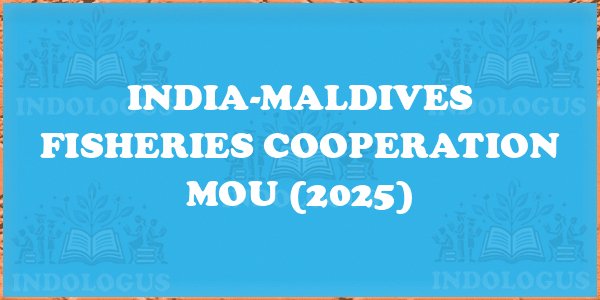The India-Maldives Fisheries Cooperation MoU (2025) signifies a significant step towards fostering a sustainable and resilient fisheries sector. This partnership aims to enhance food security, economic growth, and environmental sustainability.
Overview:
The memorandum of understanding (MoU) signed between India and Maldives focuses on strengthening cooperation in fisheries and aquaculture. This agreement, part of six MoUs exchanged during Prime Minister Narendra Modi’s State visit to Maldives, aims to boost sustainable fisheries, aquaculture development, eco-tourism, and scientific research.
Background:
- Department of Fisheries: The nodal agencies for implementation are the Department of Fisheries (India) and the Ministry of Fisheries and Ocean Resources (Maldives).
- Economic Importance: Fisheries are crucial to Maldives’ economy, while India, with its vast coastline, has a significant interest in marine resource sustainability.
- Partnership Basis: Cultural and geographical proximity between the two nations makes fisheries cooperation a natural choice for collaboration.
Significance of the MoU:
- Strengthening Bilateral Ties: Enhances the friendship between India and Maldives through marine resource partnership.
- Sustainable Resource Management: Promotes responsible fishing practices, especially in tuna and deep-sea fisheries.
- Economic Development: Boosts fish processing, aquaculture production, and eco-tourism for local economic growth.
- Skill Development: Provides training in aquatic health, refrigeration, and marine engineering for youth employment.
- Regional Food Security: Aims to increase fish availability and diversify aquaculture species for long-term nutrition security.
Objectives of the MoU:
- Sustainable Practices: Promote sustainable fisheries and aquaculture.
- Value Chain Development: Enhance trade facilitation in the fisheries sector.
- Infrastructure Scaling: Upgrade fish processing and cold storage facilities in Maldives.
- Research & Innovation: Encourage knowledge exchange and research initiatives.
- Capacity Building: Provide training in technical and managerial skills for human resource development.
Key Features of the Agreement:
- Focus Areas: Value chain development, mariculture, eco-tourism, trade facilitation.
- Infrastructure Development: Investment in cold storage, hatchery development, and processing units.
- Skill Training: Specialized training in biosecurity, aquaculture management, refrigeration, and marine engineering.
- Innovation & Research: Collaborative programs to enhance productivity and sustainability in fisheries.
- Eco-Tourism: Promotion of fisheries-based eco-tourism for income generation and resource preservation.
Key Takeaways for Competitive Exams:
- Understanding the significance of fisheries cooperation between India and Maldives for economic growth and sustainability.
- Recognizing the objectives of the MoU focusing on sustainable practices, infrastructure development, and capacity building.
- Highlighting the key features of the agreement, including focus areas, infrastructure investments, skill training, and research initiatives.



